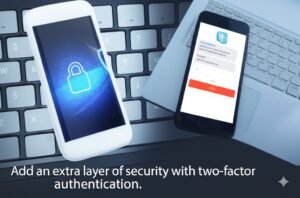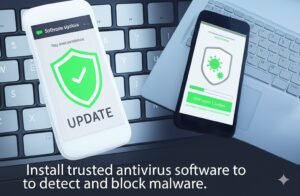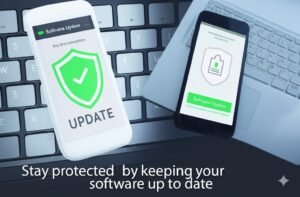In today’s digital age, the internet has become an essential part of our lives. From shopping and banking to socializing and working, we rely on the Internet for almost everything. However, with this convenience comes risk. Hackers and cybercriminals are always looking for ways to steal your data, money, or identity. That’s why cybersecurity is so important. In this blog post, we will discuss 10 effective ways to prevent cybersecurity attacks. These tips are easy to follow and suitable for everyone, even if you’re not a tech expert.
Why Should You Care About Cybersecurity?
Cybersecurity is not just for big companies or tech-savvy people. It affects everyone who uses the internet. If hackers get access to your personal information, they can cause serious damage. For example:
- They might steal your bank account details and drain your savings.
- They could misuse your identity to commit fraud.
- They might lock your files and demand payment (a type of attack called ransomware).
The good news is that you don’t need to be a computer expert to protect yourself. By following simple steps, you can stay safe online and avoid becoming a victim of cybercrime.

1. Use Strong Passwords
A strong password is your first line of defense against hackers. Many people use weak passwords like “123456” or “password.” These are easy for hackers to guess. To create a strong password:
- Use at least 12 characters.
- Mix uppercase letters, lowercase letters, numbers, and symbols.
- Avoid using predictable patterns or common words.
For example, instead of using “mypassword,” try something like “MyP@ssw0rd2023!” This makes it much harder for hackers to crack. Also, never reuse the same password across multiple accounts. If one account gets hacked, all your other accounts will be at risk.
To help you manage multiple strong passwords, consider using a password manager. A password manager stores all your passwords securely and fills them in automatically when needed.
Best Practices for Strong Passwords
2. Enable Two-Factor Authentication (2FA)
Two-factor authentication (2FA) adds an extra layer of security to your accounts. Even if someone manages to steal your password, they still won’t be able to log in without the second code. Here’s how it works:
- You enter your username and password as usual.
- The system sends a code to your phone or email.
- You enter the code to complete the login process.
Many popular websites and apps, such as Gmail, Facebook, and Instagram, offer 2FA. Turn it on wherever possible. It’s a small step that can make a big difference.
3. Keep Your Software Updated
Outdated software often has security holes that hackers can exploit. To stay safe:
- Always update your operating system (e.g., Windows, macOS, Android).
- Update apps and programs regularly.
- Set your devices to update automatically if possible.
For example, if your smartphone notifies you about a new software update, don’t ignore it. These updates often include patches for known vulnerabilities.
4. Be Careful with Emails
Phishing emails are one of the most common ways hackers trick people into giving away their personal information. These emails may look legitimate but are designed to steal your data. To protect yourself:
- Don’t click on suspicious links or download attachments from unknown senders.
- Check the sender’s email address carefully before trusting it.
- Look for signs of phishing, such as spelling mistakes or urgent requests.
If you receive an email claiming to be from your bank, don’t click any links. Instead, visit the official website directly by typing the URL into your browser.
5. Use a Reliable Antivirus Program
Antivirus software helps detect and remove malware from your device. Malware includes viruses, spyware, and ransomware. To stay protected:
- Choose a trusted antivirus program, such as Norton, McAfee, or Bitdefender.
- Keep the antivirus software updated.
- Run regular scans to check for threats.
While free antivirus tools are available, paid versions often offer more features and better protection. Investing in a good antivirus program is worth it for peace of mind.
6. Secure Your Wi-Fi Network
Your home Wi-Fi network is another potential entry point for hackers. To secure it:
- Use a strong password for your Wi-Fi router.
- Change the default admin username and password of your router.
- Enable WPA3 encryption for better security.
If you have guests over, consider setting up a separate guest network. This way, your main network remains secure.
7. Backup Your Data Regularly
Backing up your data ensures you don’t lose important files if your device gets hacked or crashes. There are two main ways to back up your data:
- Cloud Storage : Services like Google Drive, Dropbox, or iCloud allow you to store files online.
- External Hard Drive : You can copy your files to a physical device.
Schedule automatic backups so you don’t forget. For example, set your computer to back up every night while you sleep.
8. Limit Personal Information Online
Sharing too much information online makes you vulnerable to cyberattacks. To protect yourself:
- Avoid posting sensitive details like your address, phone number, or birthdate.
- Adjust privacy settings on social media platforms to limit who can see your posts.
- Be cautious about accepting friend requests from strangers.
Remember, once something is online, it’s hard to take it back. Think twice before sharing anything personal.
9. Use a Virtual Private Network (VPN)
A virtual private network (VPN) hides your IP address and encrypts your internet connection. This makes it harder for hackers to track your activity. Using a VPN is especially important when browsing public Wi-Fi networks, which are often unsecured.
Choose a trusted VPN service, such as NordVPN or ExpressVPN. Avoid free VPNs, as they may sell your data to third parties.
10. Educate Yourself and Others
Awareness is key to staying safe online. Learn about common cyber threats like phishing, ransomware, and scams. Share what you learn with family and friends. The more people know about cybersecurity, the safer everyone will be.
Tables for Better Understanding
Here are two tables to summarize key points:
Common Cyber Threats and How to Avoid Them
Best Practices for Strong Passwords

Conclusion
Cybersecurity is essential in today’s connected world. By following the 10 tips we discussed, you can significantly reduce the risk of cyberattacks. Remember, prevention is always better than dealing with the consequences of a breach. Stay vigilant, keep learning, and share your knowledge with others. Together, we can create a safer digital environment.
FAQ
Q1: What is cybersecurity?
A1: Cybersecurity means protecting your devices, data, and online accounts from hackers and cybercriminals.
Q2: Why should I update my software?
A2: Updates fix security flaws and protect your device from new threats.
Q3: Is a free antivirus enough?
A3: While free antivirus tools work, paid versions often offer more features and better protection.
Q4: Can I trust public Wi-Fi?
A4: Public Wi-Fi is risky. Use a VPN to stay safe while browsing.
Q5: How often should I back up my data?
A5: Back up your data at least once a week or whenever you add important files.


